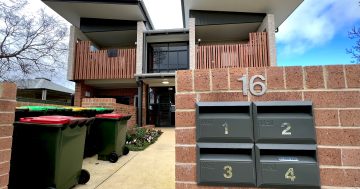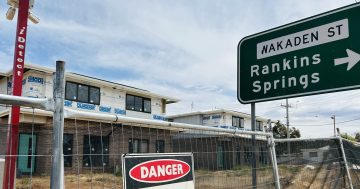
Kevin Roben said he’d never lost so much on a job in his 40 years in the industry. Photo: Oliver Jacques.
A young roofer says the NSW Government’s refusal to pay him for a government housing job in Wagga almost destroyed the small business he’d just started, while a veteran Wagga tradesman described the same project as his worst experience in 40 years in the industry.
A sleek two-storey public housing building on 16 Spring Street was completed this year, but a string of mum and dad tradies across the state continue to chase an elusive NSW Government department for payment on the work they did on the project more than a year ago.
Problems began when the NSW Government announced controversial Sydney-based company Matrix Group Co as the main contractor for the project in February 2021. Before long, subcontractors complained to the Government that Matrix wasn’t paying them.
Nevertheless, the NSW Land and Housing Corporation (LAHC) – the government body responsible for social housing – continued to pay Matrix until just before the company went bankrupt in November 2021. LAHC even paid Matrix after the company met with a liquidator to discuss going into voluntary administration.
However, LAHC refuses to pay several mum and dad tradies who did the actual building work.
Blayney’s Jake Mooney has been roofing since he was 15. By age 30, he’d managed to start his own business. The first job for JMooney Roofing was the Wagga Spring Street block.
He figured a government project would be as safe as houses. But it quickly turned into a nightmare.
“I spent four weeks in Wagga doing the work. I had to pay for my own transport, my own accommodation, and my own materials.
“I did all the work but was only paid $6000 out of the $60,000 the job cost. The Government still owe me $54,000.
“It almost ruined me. I only survived by working my a— off. I only just paid it all off this month [more than a year after the job].
“I believe the NSW Government are responsible for paying us. They are ones that chose Matrix.”

The Government housing at 16 Spring Street is now fully occupied but those who built it still haven’t been paid. Photo: Oliver Jacques.
Kevin Roben, who runs family-owned Wagga Glass and Aluminium, agrees.
“I’ve been in business for 40 years and this is the most I’ve ever lost on a job. I still haven’t been paid a cent [of the $42,000 he says he is owed].”
“The [NSW Government] are stepping back and saying ‘Not our problem’.
“But it should be their problem as [tradies] complained to them that Matrix wasn’t paying them.
“We registered our claim with the liquidator but have heard nothing since. It’s black hole stuff.
“The big question is: where did the money go?”
He also questions why the NSW Government chose the controversial Matrix Group Co, who were not licensed to do building jobs worth more than $20,000, for the project in the first place.
The Sydney company was the subject of an expose on Channel Nine’s A Current Affair over their alleged failure to pay tradies all over the state.
“Not being paid made it very hard to pay our suppliers,” Mr Roben said.
“You take $40,000 out of a cash flow, it takes about four to six months to get it back in order. You’ve still got to pay your taxes, your super, your GST. They don’t wait.”
Region provided LAHC with details on the hardship experienced by Mr Roben and Mr Mooney as a result of LAHC not paying them for this project. LAHC declined to respond.
Oasis Scaffolding and Bricklaying ($90,000), Wagga’s AC Electrics ($64,000), Plaster Pros Wagga ($55,000), New-Crete Concreting ($28,000) have also told Region they are still owed large sums of money for work they did on the same project.
At a NSW Parliament hearing on 5 November 2021, Michael Cassel, the then chief executive officer of LAHC, was asked why LAHC continued to pay Matrix even after Amy Burns of Oasis Scaffolding and Bricklaying complained that Matrix wasn’t paying her company.
“The process of paying contractors is very clear and outlined in the Security of Payments Act. You cannot just not pay somebody because somebody has made a phone call to us and said, ‘He hasn’t paid me’,” he said.
This is disputed by Ms Burns.
“The Government had the flexibility under the Security of Payments Act to stop paying Matrix and instead to pay subcontractors directly,” she said.
“But the Government kept paying [Matrix] until November … they paid him three times after I complained to them we weren’t getting paid.”
All tradies who spoke to Region say they will continue to fight to be paid for a job they did more than a year ago.
















